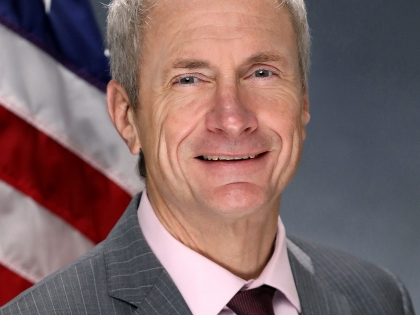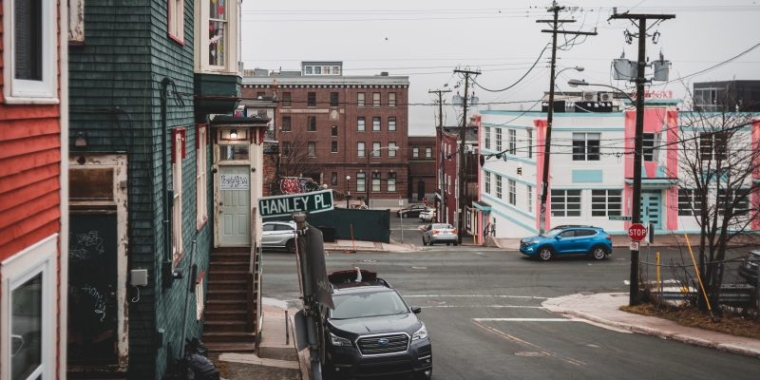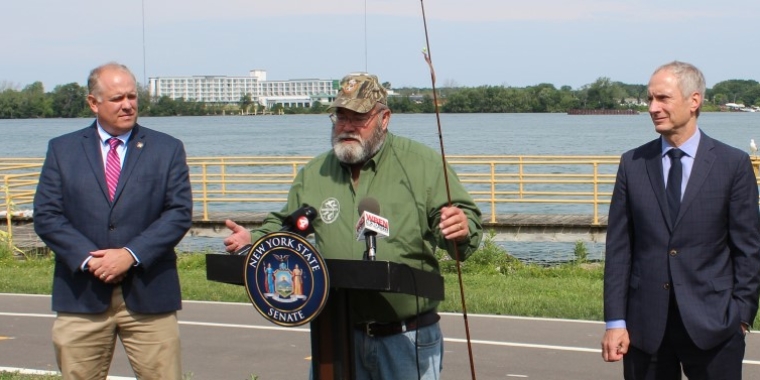
Empowering communities to invest in affordable housing (The Capitol Pressroom)

Audio:
https://soundcloud.com/user-18109193/07-18-23-cpseg3
Transcript:
In 2021, the state authorized a community on eastern Long Island to create a community housing fund to help finance the creation of more affordable housing. With most of New York facing a shortage of affordable housing though, state senator Sean Ryan, a Buffalo area Democrat, is proposing to let communities around the state replicate the initiative authorized for the Peconic Bay region, and he joins us now to discuss his legislation. Welcome back to the Capitol Pressroom, Senator.
Senator Sean Ryan
Well, it's great to be on today, David.
David Lombardo
So, for starters, how would you describe the availability of affordable housing in your Western New York district?
Senator Sean Ryan
I would say at shrinking. Buffalo has a reputation as a place with a lot of affordable housing, but you have to balance that off against our low salaries. So the part of the market for apartments that were maybe between $600 and $900, a decade ago you could find vacancies in there. Those are all but disappeared and the affordable housing units are just harder and harder to come by.
David Lombardo
And what about home prices, in terms of purchasing them? Are you seeing a dramatic increase in demand?
Senator Sean Ryan
We've had a steady and slow increase in the Buffalo housing market since the early 2000s. Now, mind you, we had spent the 30 years before that at very flat housing rates. I remember my my mom bought a house for $110,000 in the late '80s, and 15 years later, it was worth $110,000. But those times have changed. The houses in that neighborhood have gone up at least double in value in that time. It didn't seem to hurt the pocketbook as much when interest rates were 2%, but they're not at 2% anymore. So we're really starting to feel the squeeze.
David Lombardo
Let's turn to addressing this situation, at least to some degree, and talk about your legislation, which would authorize municipalities around the state -- if they were so inclined -- to create community housing funds. What exactly are these funds? And how could they potentially help alleviate the shortage of affordable housing?
Senator Sean Ryan
We copied off what you mentioned before: The work that they were doing in East Hampton, with this Peconic Bay region. They were the first ones to come up with, "if we put a real estate transfer tax on the sale of housing, took that money, put it into a dedicated community housing fund, that can be only used to build affordable housing, that we could start generating more affordable housing units." I've been watching that for a few years, and it seems to be quite successful. So I teamed together with Assemblymember Didi Barrett, and we [introduced this bill] that will allow municipalities to do the same thing that they did in eastern Long Island.
David Lombardo
How much leeway do municipalities have if they do want to implement a community housing fund? For example, under your legislation, do they get to set the rate of the tax? Do they get full discretion over how the money would be spent?
Senator Sean Ryan
We made it so it's a very flexible program. You could charge a tax as nominal as one-tenth of a percent, or go up to two percent. We put a ceiling in place, where you can't go more than two percent, (and) we limited what you can do with that money. Assistance for first time homeowners, for building new affordable housing, doing rehabilitations to bring houses up to code, or even purchasing existing buildings. So we limited what you could use it for; it's got to stay tight in the area that's going to really impact the affordable housing market. It's a complex problem, how to make affordable housing available in your community. And this would give municipalities flexibility to really tailor it toward their communities.
David Lombardo
Have you heard from municipal leaders either in your district or around the state that they would like to take advantage of this tool, so to speak?
Senator Sean Ryan
This legislation was in response to various communities throughout the state reaching out and saying, "we want to do what they did in eastern Long Island," and only then did they find out that they couldn't do it -- that that was only applied to that one community. So we we opened it up to make it so anyone the state could opt in, but they have to put it in front of a community referendum, because it's going to be a tax on existing housing sales, and it'll be paid directly by existing community members. And if they want to go down this route, the municipality has to set up a fund. And then after that fund is set up, they have to put it on the ballot with the November elections.
David Lombardo
What do you see as the potential impact of one of these programs? If, say, a community sets up a housing fund? Could it be the solution to a community's affordable housing woes? Or would this be just part of a broader response that a community would have to embark on if they wanted to really address this problem?
Senator Sean Ryan
I'd say it will be part of a broader response. It'll allow the community to come up with their own programs, rather than having to rely on New York State Housing and Community Renewal, to see if we can squeeze one of your programs into our community. And those programs often don't make sense for a lot of non-urban areas. So this would allow the community to essentially self-fund their own affordable housing program. It sort of returns power to a very, very localized base, because they're the ones on the ground seeing it. But most likely it will be applied to communities that have vast disparities between their highest end of their housing market and their bottom housing market.
David Lombardo
Any concerns that an additional cost in the home buying process could just exacerbate the existing challenge that people are finding right now in terms of their ability to purchase a home?
Senator Sean Ryan
This fee would be charged to the seller of real estate. So when you sell your real estate, that's accrued in value, you pay this fee back to the community. So it doesn't impact the cost on a new home buyer. It only impacts the seller. I gave the example of my mom's house that was flat for years, and recently has doubled in value; that surcharge would be paid by the seller, who enjoyed the great appreciation of their asset.
David Lombardo
And is that the way the program is envisioned for the Peconic Bay region as well?
Senator Sean Ryan
Yes. You know that eastern Long Island real estate market. They have a lot of very expensive housing. And so when it's sold, a small portion of that comes off and it goes back to the municipal housing trust
David Lombardo
Finally, this legislation is a supply side answer to New York's affordable housing shortage. So if it was to be enacted, we probably wouldn't see any benefits for years to come. So what would you like to see done, if anything, in the short term to address access to affordable housing?
Senator Sean Ryan
Part of what I'm spending my summer doing is I'm working with different Western New York-based research institutions to take a good look at Buffalo's current housing market. How many vacant lots do we have? We have tens of thousands of vacant lots in the city, but how to form programs to make it so we can rebuild on those lots. Right now, no one's building on those lots because the people in those communities couldn't afford the price of a new build. And we're also looking at the history of evictions, pre-pandemic to now, to see what's going on in Buffalo, Rochester, and Syracuse with the eviction story, with the aim of coming up with a housing arrears program. So people who are being evicted for less than $2,000 would be able to stay in their home. We need to do a lot of work on this front, but one thing is for sure: There is no silver bullet or magic wand that's going to fix it all at once, and we have to look at a really multi-pronged approach to this.
David Lombardo
We've been speaking with state senator Sean Ryan, he's a Buffalo area Democrat. Senator, thank you so much for making the time.
Senator Sean Ryan
Thanks so much.


